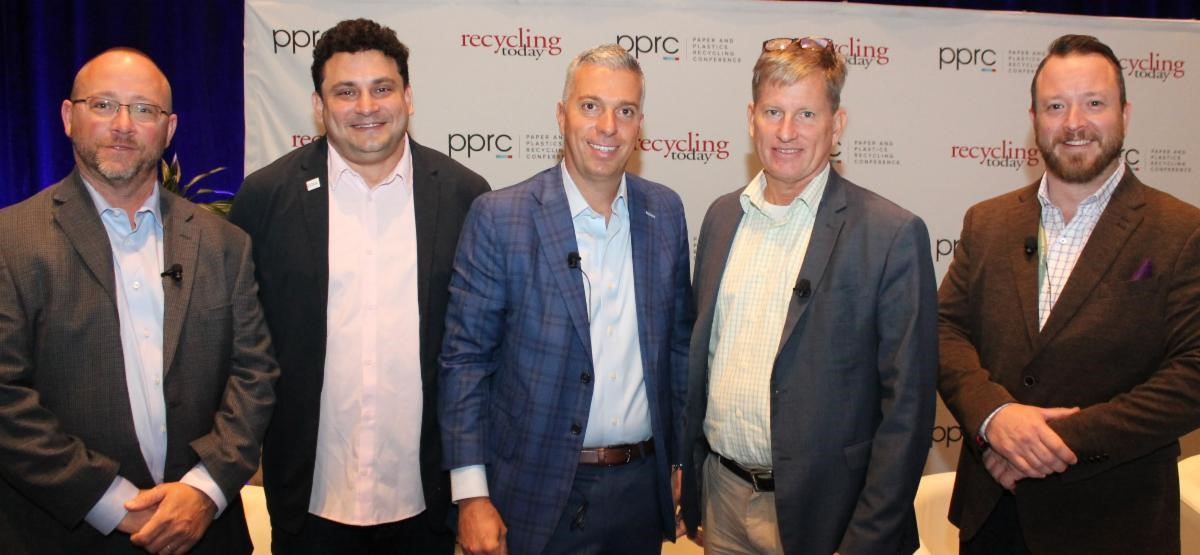ISRI’s Paper Stock Industries (PSI) Chapter had a high-profile presence at the Paper and Plastics Recycling Conference (PPRC) Oct. 19 and 20 in Chicago, beginning with an Oct. 18 “PSI Palooza” reception.
The event—which had been postponed the past two years due to the COVID-19 pandemic—attracted more than 100 PSI members and friends at the Marriott Marquis Chicago, where they reconnected and kicked off PPRC. Notably, the reception doubled as a thank-you for those who donated to PSI’s 2023 scholarship fund. As an extra bit of fun, PSI handed out tie-dyed “PSI Palooza” bandanas that recipients could bring to the PSI-led “OCC/Mixed Paper” session on Oct. 20 to earn a chance to win gift-card door prizes.
PSI Chapter President Shawn State of Pratt Industries moderated PPRC’s “OCC/Mixed Paper” session, which featured Evan Barrett of GFL Environmental Recycling, John Grinnell of Greif, Jeff Ryalls of International Forest Products (IFP), and Sean Davidson of Davis Index. The session examined:
- How the speakers’ companies are navigating current market challenges.
- How COVID-19 affected the quality and volume of curbside recyclables.
- How the export market has changed.
- How their companies have focused on safety in recent years, and how they are attracting the next generation into the recycling industry.
Current market conditions are, “testing the economics of recycling” and forcing recyclers to “focus on the basics,” including closely managing costs, narrowing their “freight circles,” and strengthening partnerships with suppliers to keep material flowing, Grinnell says. Finding and retaining truck drivers has been particularly challenging in recent years, prompting IFP to increase wages for drivers, compensate them when they face delays, and ensure they are home—rather than on the road—every night, Ryalls says.
In light of dwindling supplies of high-quality materials and changes in the curbside recycling mix, recyclers are “seeing a lot more activity and appetite for mixed paper,” Barrett says. “We’ve figured out how to make it a more consumable product, one that requires less handling and processing,” Barrett added. Ryalls agreed, noting that “more domestic mills are using it than ever before, and we’ll continue to see that happen.”
On the export side, recovered fiber that used to go directly to China now goes to India, Europe, and Southeast Asia, where it often is converted to recycled pulp that ultimately ends up in China, the speakers noted. That dynamic adds complexity to the transportation market, Grinnell says. While recyclers used to get export bookings easily on freight lines, the carriers have dictated the market in the past three years, so IFP has “shipped material to where we could get a booking,” Ryalls says.
Regardless of the grade or the market, quality is the key factor, especially since China imposed its National Sword program in 2018. “If you have the proper quality, you have less trouble with markets,” Barrett says. Fortunately, Ryalls adds, “The industry is really moving in the right direction and doing things the right way.”
As for attracting the next generation into the recycling industry, Grinnell asserts: “One of the greatest things you can have in a career is a sense of purpose, and this business has it. That particularly resonates with the millennial generation.” The entrepreneurial aspect of the recycling business—in which everyone has a chance to contribute and make a difference—also appeals to younger workers, Grinnell says. “That gives our industry a unique platform.” It’s important to give younger staff the opportunity to advance or they’ll move on, he says. As for where to find new talent, Ryalls recommends recruiting on college campuses, and Barrett says to look to different industries.
At the end of the session (and at a “Fast and Furious” breakout session in the PPRC expo hall), Davidson discussed how Davis Index plans to offer new price indexes, market analysis, and news for recycled paper and plastic commodities in the coming months. In his view, there is “no real structure or process in current price assessments.” Instead, Davis will apply to paper and plastics the same rigorous price-indexing practices it already uses for many metal commodities.
The company plans to offer domestic U.S. price indexes as well as prices in the domestic markets of export countries for comparison.
Photo courtesy of Kent Kiser. Caption: PSI Chapter President Shawn State (far left) moderated PPRC’s “OCC/Mixed Paper” panel discussion, with speakers Sean Davidson, Jeff Ryalls, John Grinnell, and Evan Barrett.










